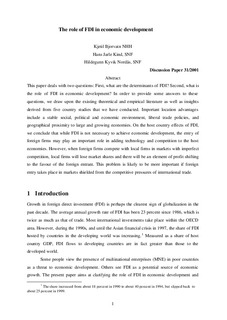| dc.description.abstract | This paper deals with two questions: First, what are the determinants of FDI? Second, what is
the role of FDI in economic development? In order to provide some answers to these
questions, we draw upon the existing theoretical and empirical literature as well as insights
derived from five country studies that we have conducted. Important location advantages
include a stable social, political and economic environment, liberal trade policies, and
geographical proximity to large and growing economies. On the host country effects of FDI,
we conclude that while FDI is not necessary to achieve economic development, the entry of
foreign firms may play an important role in adding technology and competition to the host
economies. However, when foreign firms compete with local firms in markets with imperfect
competition, local firms will lose market shares and there will be an element of profit shifting
to the favour of the foreign entrant. This problem is likely to be more important if foreign
entry takes place in markets shielded from the competitive pressures of international trade. | en |
